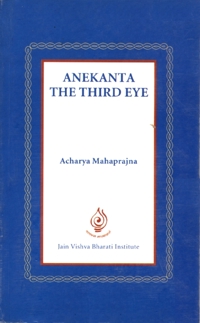
In the explanation of the universal laws anekanta has lent balance. Even in the world of conduct and thoughts, anekanta plays an important role. Restraint and equanimity are also results of anekanta. Without the anekanta view there would be no reason for restraint. Through anekanta we accept the coexistence of opposites as a fact. Nothing in this world is without limits. Everything has its limits. There is need for equanimity. Loss and gain, both are to be accepted. It is the norm of life that if there is gain there will also be loss and if there is loss, there will also be gain. The two are not distanced, they are mutually connected and go together. Gain is linked to loss and loss to gain. The two are one. The difference is only in time or space. There is no distance between happiness and sorrow. No distance between life and death, they both go together. Sometimes one feels happy and life seems bright and sometimes one feels sad and life seems miserable. Where is the distance between water pulleys? It is one single chain. The wheels bring in water, empty it and return. Wheels full of water and empty of water keep coming and going. They work together. Similarly joy and sorrow work together. Life and death work together. There is no second that belongs entirely to life or entirely to death. The first second of life is also the first second of death. Death is not an event that is to take place after 70-80 years. It can take place even in the first second. With the first second of birth the event of death also takes place. The one who does not die in the first second will become immortal, he will never die. The one who is not born in the first second cannot be created in the next. Every object experiences birth every second. Creation and destruction go hand in hand. One cannot find even one man who has been only praised, never condemned or always condemned and never praised. Both go together. The balance is maintained.
Loss and gain, praise and insults, life and death, all of them go together. We have a problem when we do not go along with them. If man learns to go along with them then he will be a truly spiritual person, a true follower of anekanta. This way his problems come under his control. But man is very strange, he does not like to move along with them. He wants to move independently. He wants gain but not losses, he wants joy but not sorrow, he wants life but is not willing to accept death and he wants praise, never condemnation. He then forgets the universal rule. In this dualistic world, nothing comes alone. Everything is in pairs. Man is ignorant. He wants to break the order of anekanta and wants only a single dimension. When the world and nature have a rule, how can it be broken? And yet man makes his own only one perspective and does not want the other. Under the pressure of not wanting loss but wanting gain, not wanting insults but wanting praise, man gets bowed down to break one day.
 Acharya Mahaprajna
Acharya Mahaprajna
